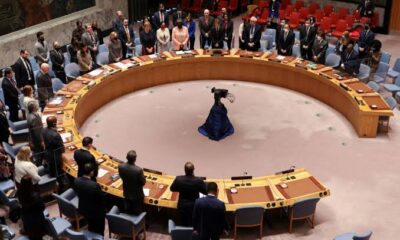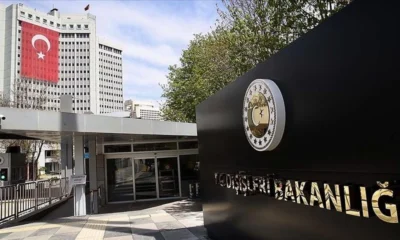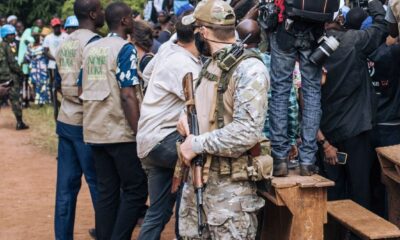Strictly Personal
Mr West, Mr East, Mr Far-East fight for Africa; it will end in tears, By Joachim Buwembo
Published
1 year agoon

Africa has, since independence, been like a beautiful young woman overwhelmed by the attention powerful men pay to her, oblivious to the fact that her physical beauty has to fade and, unless she nurtures other forms of beauty like material wealth and successful children, she will be discarded and ignored in a few decades.
She risks facing the same fate as her mother, who was born 60 years ago and grew up seeing two rich but vicious men competing for her.
They were Mr West and Mr East. They had their own families and were only interested in using her body for pleasure, deceiving her with counterfeit jewellery, synthetic shoes and handbags picked cheaply in the backstreet shops, where they came from.
Both powerful men, Mr East and Mr West, convinced her that pregnancy was bad for her figure and kept forcing her to take contraceptives, which she did willingly, for she did not want to be out of action for months while other girls danced and supplied pleasure to the rich men.
So, Mama Africa avoided growing babies in her fertile womb, yet this would have obligated the powerful fathers to plan for her so as to have a good foundation with which to raise their children. The only plans they ever made with her were for partying and holidaying.
She refused to listen to the old women who couldn’t speak English or French as they tried to advise her to get children with one of the powerful men. And, as sure as night follows day, her beauty faded with the years, and she ceased being attractive to either Mr West or Mr East. She managed to get a child, and a daughter before menopause caught up with her, but the father was a poor, fellow African.
The daughter grew and the same powerful old men chased after her lustfully. Her ailing mother, already over 60 years old but looking 90 due to poor living conditions and a gum from which teeth have fallen, tried to warn her against Mr East and Mr West, but in vain.
Despite their advanced age, she wanted their cheap counterfeit gifts. But this time they had been joined by Mr Far-East, who is quick at giving girls cheap goodies without insisting that they dress in certain ways, use particular perfumes or hold knife and fork in certain ways – after all, he doesn’t use them either, preferring sticks that he manoeuvres with amazing dexterity. Mr Far-East, too, doesn’t want to have children with her, as he already has too many of his own.
Powerful men want to use her body without making it productive.
The competition for Ms Africa by the three has been more vicious than it was with her mother, as now they are even prepared to fight among themselves and also beat her up if need be. Several times, she listened to her mother’s reasoning and stopped swallowing the birth control pills and conceived a few times.
But Mr West beat her up so badly that she miscarried. Last time the pregnancy was so big neighbours were proudly saying she was finally going to settle because the scan had shown she was carrying twins, a boy and a girl. She died, alongside her promising twins due to the beating.
But there is a clever girl in her neighbourhood to whom the three powerful men turned after the death of the one who was carrying twins. The rich guys learned that there is something in her genes that can make the children she produces extremely smart and able to solve the current problems that threaten their very lives. The girl is now pregnant, but she has run to the elders who are hiding her from the powerful men who want to take her away and she gives birth in their homes.
All three are already claiming the pregnancy. But the girl swears she is not going anywhere and wants to give birth to the anticipated wonder child in her village, where they can help develop her community, given the rare attributes that Mr West, Mr East and Mr Far-East have confirmed that she has, after using their advanced scientific analytical tools.
Mr West wants to pay goons in the neighbourhood to raid the elders’ compound, where she is being protected, and take her away. Mr East wants to help the elders beat off Mr West’s goons and then claim her child. Meanwhile, Mr Far-East is watching with a keen eye. Nobody knows his plan, but he also says the pregnancy is his. They all want the contents of her womb.
Heaven knows where it will end.
Buwembo is a Kampala-based journalist. E-mail:buwembo@gmail.com
You may like
-


TP Mazembe pip AS FAR to win African Women’s Champions League
-


Nigeria ranks 7th with international students’ enrolment in US
-


Nigeria gets backing of West African countries in bid to join UN security council
-


IMF recommends exporting African countries make crucial changes. Here’s why
-


African Union must ensure Sudan civilians are protected, By Joyce Banda
-


Turkey to pursue better African collaboration in Djibouti
Strictly Personal
Budgets, budgeting and budget financing, By Sheriffdeen A. Tella, Ph.D.
Published
5 days agoon
November 20, 2024
The budget season is here again. It is an institutional and desirable annual ritual. Revenue collection and spending at the federal, State and local government levels must be authorised and guided by law. That is what budget is all about. A document containing the estimates of projected revenues from identified sources and the proposed expenditure for different sectors in the appropriate level of government. The last two weeks have seen the delivery of budget drafts to various Houses of Assembly and the promise that the federal government would present its draft budget to the National Assembly.
Do people still look forward to the budget presentation and the contents therein? I am not sure. Citizens have realised that these days, governments often spend money without reference to the approved budget. A governor can just wake up and direct that a police station be built in a location. With no allocation in the budget, the station will be completed in three months. The President can direct from his bathroom that 72 trailers of maize be distributed to the 36 states as palliatives. No budget provision, and no discussion by relevant committee or group.
We still operate with the military mentality. We operated too long under the military and of the five Presidents we have in this democracy, two of them were retired military Heads of State. Between them, they spent 16 years of 25 years of democratic governance. Hopefully, we are done with them physically but not mentally. Most present governors grew up largely under military regimes with the command system. That is why some see themselves as emperor and act accordingly. Their direct staff and commissioners are “Yes” men and women. There is need for disorientation.
The importance of budget in the art of governance cannot be overemphasized. It is one of the major functions of the legislature because without the consideration and authorisation of spending of funds by this arm of government, the executive has no power to start spending money. There is what we refer to as a budget cycle or stages. The budget drafting stage within the purview of the executive arm is the first stage and, followed by the authorisation stage where the legislature discusses, evaluates and tinkers with the draft for approval before presenting it to the President for his signature.
Thereafter, the budget enters the execution phase or cycle where programmes and projects are executed by the executive arm with the legislature carrying out oversight functions. Finally, we enter the auditing phase when the federal and State Auditors verify and report on the execution of the budgets. The report would normally be submitted to the Legislature. Many Auditor Generals have fallen victim at this stage for daring to query the executives on some aspects of the execution in their reports.
A new budget should contain the objectives and achievements of the preceding budget in the introduction as the foundation for the budget. More appropriately, a current budget derives its strength from a medium-term framework which also derives its strength from a national Development Plan or a State Plan. An approved National Plan does not exist currently, although the Plan launched by the Muhammadu Buhari administration is in the cooler. President Tinubu, who is acclaimed to be the architect of the Lagos State long-term Plan seems curiously, disillusioned with a national Plan.
Some States like Oyo and Kaduna, have long-term Plans that serve as the source of their annual budgets. Economists and policymakers see development plans as instruments of salvation for developing countries. Mike Obadan, the former Director General of the moribund Nigeria Centre for Economic and Management Administration, opined that a Plan in a developing country serves as an instrument to eradicate poverty, achieve high rates of economic growth and promote economic and social development.
The Nigerian development plans were on course until the adoption of the World Bank/IMF-inspired Structural Adjustment Programme in 1986 when the country and others that adopted the programme were forced to abandon such plan for short-term stabilisation policies in the name of a rolling plan. We have been rolling in the mud since that time. One is not surprised that the Tinubu administration is not looking at the Buhari Development Plan since the government is World Bank/IMF compliant. It was in the news last week that our President is an American asset and by extension, Nigeria’s policies must be defined by America which controls the Bretton Woods institutions.
A national Plan allows the citizens to monitor quantitatively, the projects and programmes being executed or to be executed by the government through the budgeting procedure. It is part of the definitive measures of transparency and accountability which most Nigerian governments do not cherish. So, you cannot pin your government down to anything.
Budgets these days hardly contain budget performance in terms of revenue, expenditure and other achievements like several schools, hospitals, small-scale enterprises, etc, that the government got involved in successfully and partially. These are the foundation for a new budget like items brought forward in accounting documents. The new budget should state the new reforms or transformations that would be taking place. Reforms like shifting from dominance of recurrent expenditure to capital expenditure; moving from the provision of basic needs programmes to industrialisation, and from reliance on foreign loans to dependence on domestic fund mobilisation for executing the budget.
That brings us to the issue of budget deficit and borrowing. When an economy is in recession, expansionary fiscal policy is recommended. That is, the government will need to spend more than it receives to pump prime the economy. If this is taken, Nigeria has always had a deficit budget, implying that we are always in economic recession. The fact is that even when we had a surplus in our balance of payment that made it possible to pay off our debts, we still had a deficit budget. We are so used to borrowing at the national level that stopping it will look like the collapse of the Nigerian state. The States have also followed the trend. Ordinarily, since States are largely dependent on the federal government for funds, they should promote balanced budget.
The States are like a schoolboy who depends on his parents for school fees and feeding allowance but goes about borrowing from classmates. Definitely, it is the parents that will surely pay the debt. The debt forgiveness mentality plays a major role in the process. Having enjoyed debt forgiveness in the past, the federal government is always in the credit market and does not caution the State governments in participating in the market. Our Presidents don’t feel ashamed when they are begging for debt forgiveness in international forum where issues on global development are being discussed. Not less than twice I have watched the countenance of some Presidents, even from Africa, while they looked at our president with disdain when issues of debt forgiveness for African countries was raised.
In most cases, the government, both at the federal and state cannot show the product of loans, except those lent by institutions like the World Bank or African Development Bank for specific projects which are monitored by the lending institutions. In other cases, the loans are stolen and transferred abroad while we are paying the loans. In some other cases, the loans are diverted to projects other than what the proposal stated. There was a case of loans obtained based on establishing an international car park in the border of the State but diverted to finance the election of a politician in the State. The politician eventually lost the election but the citizens of the State have to be taxed to pay the loan. Somebody as “Nigeria we hail thee”.
Transformation in budgeting should commence subsequently at the State and federal level. Now that local government will enjoy some financial autonomy and therefore budgeting process, they should be legally barred from contracting foreign loans. They have no business participating in the market. They should promote balanced budget where proposed expenditures must equal the expected revenues from federal and internal sources. The State government that cannot mobilise, from records, up to 40 percent of its total budget from IGR should not be supported to contract foreign loans. The States should engage in a balanced budget. The federal government budget should shift away from huge allocations to recurrent expenditure towards capital expenditure for capital formation and within the context of a welfarist state.
Sheriffdeen A. Tella, Ph.D.
Strictly Personal
African Union must ensure Sudan civilians are protected, By Joyce Banda
Published
1 month agoon
October 25, 2024
The war in Sudan presents the world – and Africa – with a test. This far, we have scored miserably. The international community has failed the people of Sudan. Collectively, we have chosen to systematically ignore and sacrifice the Sudanese people’s suffering in preference of our interests.
For 18 months, the Rapid Support Forces (RSF) and the Sudanese Armed Forces (SAF) have fought a pitiless conflict that has killed thousands, displaced millions, and triggered the world’s largest hunger crisis.
Crimes against humanity and war crimes have been committed by both parties to the conflict. Sexual and gender-based violence are at epidemic levels. The RSF has perpetrated a wave of ethnically motivated violence in Darfur. Starvation has been used as a weapon of war: The SAF has carried out airstrikes that deliberately target civilians and civilian infrastructure.
The plight of children is of deep concern to me. They have been killed, maimed, and forced to serve as soldiers. More than 14 million have been displaced, the world’s largest displacement of children. Millions more haven’t gone to school since the fighting broke out. Girls are at the highest risk of child marriage and gender-based violence. We are looking at a child protection crisis of frightful proportions.
In many of my international engagements, the women of Sudan have raised their concerns about the world’s non-commitment to bring about peace in Sudan.
I write with a simple message. We cannot delay any longer. The suffering cannot be allowed to continue or to become a secondary concern to the frustrating search for a political solution between the belligerents. The international community must come together and adopt urgent measures to protect Sudanese civilians.
Last month, the UN’s Independent International Fact-Finding Mission for Sudan released a report that described a horrific range of crimes committed by the RSF and SAF. The report makes for chilling reading. The UN investigators concluded that the gravity of its findings required a concerted plan to safeguard the lives of Sudanese people in the line of fire.
“Given the failure of the warring parties to spare civilians, an independent and impartial force with a mandate to safeguard civilians must be deployed without delay,” said Mohamed Chande Othman, chair of the Fact-Finding Mission and former Chief Justice of Tanzania.
We must respond to this call with urgency.
A special responsibility resides with the African Union, in particular the AU Commission, which received a request on June 21 from the AU Peace and Security Council (PSC) “to investigate and make recommendations to the PSC on practical measures to be undertaken for the protection of civilians.”
So far, we have heard nothing.
The time is now for the AU to act boldly and swiftly, even in the absence of a ceasefire, to advance robust civilian protection measures.
A physical protective presence, even one with a limited mandate, must be proposed, in line with the recommendation of the UN Fact-Finding Mission. The AU should press the parties to the conflict, particularly the Sudanese government, to invite the protective mission to enter Sudan to do its work free from interference.
The AU can recommend that the protection mission adopt targeted strategies operations, demarcated safe zones, and humanitarian corridors – to protect civilians and ensure safe, unhindered, and adequate access to humanitarian aid.
The protection mission mandate can include data gathering, monitoring, and early warning systems. It can play a role in ending the telecom blackout that has been a troubling feature of the war. The mission can support community-led efforts for self-protection, working closely with Sudan’s inspiring mutual-aid network of Emergency Response Rooms. It can engage and support localised peace efforts, contributing to community-level ceasefire and peacebuilding work.
I do not pretend that establishing a protection mission in Sudan will be easy. But the scale of Sudan’s crisis, the intransigence of the warring parties, and the clear and consistent demands from Sudanese civilians and civil society demand that we take action.
Many will be dismissive. It is true that numerous bureaucratic, institutional, and political obstacles stand in our way. But we must not be deterred.
Will we stand by as Sudan suffers mass atrocities, disease, famine, rape, mass displacement, and societal disintegration? Will we watch as the crisis in Africa’s third largest country spills outside of its borders and sets back the entire region?
Africa and the world have been given a test. I pray that we pass it.
Dr Joyce Banda is a former president of the Republic of Malawi.
EDITOR’S PICK


EU withdraws Niger diplomat after junta accuses it of mismanaging aid
The European External Action Service (EEAS) has announced that the European Union would return its ambassador from Niger after the...


Mali: 7 Russian mercenaries killed
An al Qaeda offshoot in North Africa has claimed responsibility for the attack in central Mali, killing at least seven...


Mpox remains health emergency, WHO insists
The World Health Organisation (WHO) has insisted that the Mpox epidemic remains a public health emergency. WHO first declared an...


Italy concerned over adult actor detained in Egypt
Officials in Italy, where sentiments are still high over the unresolved murder of student Giulio Regeni, who was detained and...


Fintech startup DigMo launched in Zambia to gamify financial planning
DigMo, a gamified fintech startup which helps users to build wealth tools from low to middle-income earners, has been launched...


TP Mazembe pip AS FAR to win African Women’s Champions League
TP Mazembe of the Democratic Republic of Congo (DRC) became the third team to win the 2024 African Women’s Champions...


Nicki Minaj eulogizes Davido for collaborating with her on new song
American rapper, Onika Maraj, popularly known as Nicki Minaj, has poured encomium on Nigerian Afrobeats superstar, David Adeleke, aka Davido,...


Zambia: Farmers’ union warns of uncertain future for agriculture sector
The Small-Scale Farmers Development Agency (SAFADA) of Zambia has warned of uncertainty on the future of the agricultural sector, stating...


Nigeria: CSO urges President Tinubu to investigate missing funds in Humanitarian Ministry
A Nigerian civil society organization, the Socio-Economic Rights and Accountability Project (SERAP), has called on President Bola Tinubu to launch...


South African DJ Black Coffee bags World’s Best DJ 2024
South African disc jockey, DJ Black Coffee, has been named the World’s Best DJ 2024 at the Golden Moon Awards....
Trending
-

 Politics2 days ago
Politics2 days agoMauritius’ Prime Minister to double as Finance Minister
-

 Metro2 days ago
Metro2 days agoFinland-based Nigerians in panic as authorities search for Simon Ekpa’s sponsors
-

 Metro17 hours ago
Metro17 hours agoNigeria: CSO urges President Tinubu to investigate missing funds in Humanitarian Ministry
-

 Metro2 days ago
Metro2 days agoZambian govt successfully repatriates trafficked toddler from Mozambique


